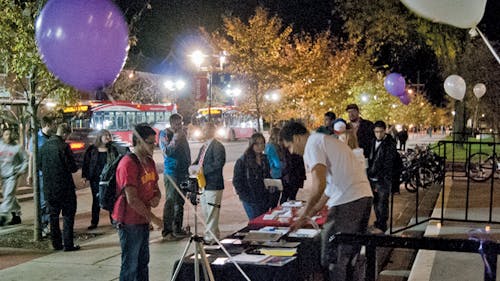Vigil raises awareness about overdose, honors victims

When students overdose on drugs or alcohol on college campuses, their friends will often scatter, holding out hope that they will be okay, said Sen. Joseph Vitale (D-19).
Vitale, who drafted the Overdose Prevention Act, spoke at last night’s “Overdose Vigil,” held on the steps of Brower Commons on the College Avenue campus. Decorated with purple and white balloons with electric candles illuminating the night, about 30 people gathered to honor those who have died due to an overdose.
The vigil — hosted by the Rutgers Health Outreach, Promotion and Education program and the Rutgers Institute for Women’s Leadership — was also held to reduce the stigma surrounding addiction. Most people don’t understand that it is a brain disease, said Didem Aksoy, a School of Arts and Sciences senior.
Aksoy, who works for H.O.P.E., has been in recovery from an alcohol addiction for a little more than five years.
“When I say that I am openly in recovery, people are like, ‘Oh, I would never guess that,’ or ‘Oh, you’re so well put together,’ and I’m like, ‘It’s not about that,’” she said.
In addition to increasing awareness about the Overdose Prevention Act, Francine Glaser, a School of Arts and Sciences senior, read the 90 names of people from the Rutgers and New Jersey communities who have passed away from an overdose.
Glaser was inspired to create the event after a friend of hers discovered that there have been drug overdoses and deaths on the Rutgers campus that have not been publicly addressed.
“I thought, ‘Well this is bad — it shouldn’t be a secret,’” she said. “At least it shouldn’t be hidden.”
Only “big deaths” are publicized, Glaser said, referring to celebrity deaths. Maybe by acknowledging addiction, fewer people will fall victim to it because they will feel comfortable speaking openly.
Two Rutgers students have died due to heroin overdose in the past 15 months, Glaser said. Though addiction is taboo, the only way lives can be saved is if the stigma is broken.
As an emergency medical technician, Rachel Norcross, also a peer educator for Rutgers H.O.P.E., has firsthand experience with people who have overdosed.
“It’s really scary because the people are completely out, and you have to completely revive them with tons of medications,” said Norcross, a School of Arts and Sciences junior. “And even when they come back, sometimes they can come back very violent.”
The act allows the friends of someone who has overdosed to call 911 without fear of legal consequences, Vitale said.
Part of the act allows for parents, spouses or family members to carry Narcan, the antidote for an opioid overdose.
“What happens in an overdose is the brain tells your heart to stop beating,” he said. “And Narcan … reverses the effect of the overdose.”
Vitale also spoke of the stigma that surrounds addiction and said people view addicts as dirty, strange or weak.
“Addiction is an itch you can’t scratch,” she said. “It’s the thirst you can’t satiate.”
In reality, an addiction is no different from cancer, heart disease or diabetes, Vitale said. Society needs to begin talking about addiction like a disease.
“If we don’t attack this issue with the same sort of force that it’s attacking us, we’ll never be where we need to be,” he said.
Linda Surks, who lost her son to a prescription drug overdose in December 2003, spoke at the vigil.
Jason Surks, a happy and loving person who was involved with his youth group, kept his addiction very well hidden. His girlfriend of two years had no inclination about Jason’s addiction.
After his death, Linda Surks said a search of his computer showed visits to websites that taught him how to safely abuse drugs.
He thought he was being safe, she said.
“Jason had a love of life, he never wanted this to happen,” she said. “It is so important to understand and believe the potential consequences of this behavior.”



